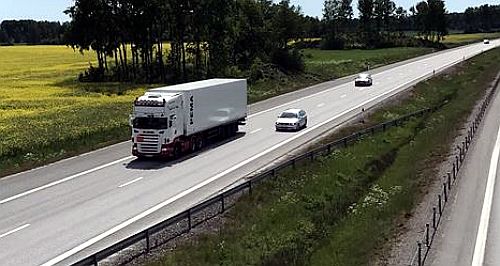Make / Model Search
News - General News - Electric VehiclesElectric roads provide charging on the moveSwedish study promotes ‘electric road’ idea, capable of charging EVs while driving31 Mar 2023 WITH technology for the whole battery electric vehicle world rapidly evolving comes news that ‘electric roads’ could pave the way for smaller car batteries and a more convenient BEV ownership experience.
Information coming out of Chalmers University of Technology (CUT) in Sweden points to a possible near future when an electric car recharges from the road while driving with benefits including the size of the battery that the university says can be reduced by up to 70 per cent.
Further, using such a system reduces the load on the power grid that can be spread out over the day.
According to CUT, charging on the move suits most people, but not everyone. This is shown by a new study, where, for the first time, researchers combined the so-called electric road system with real-life driving patterns of Swedish drivers.
With a ban on the sale of ICE vehicles looming by 2030 in Sweden, and across broader Europe, EV sales have skyrocketed which has already had a knock-on effect causing uneven load on the power grid and where owners can charge electric vehicles.
In a statement, CUT says several countries, including Sweden, Denmark, and Germany, are testing whether electric road systems (ERS) can be used to electrify road networks. An ERS charges moving vehicles with either loops in, or next to the road, or with wires suspended above vehicles, similar to trams and trains.
The main advantages of all three models are that vehicles do not need to be parked to recharge, and there is a reduced need for a large battery to store energy to overcome so-called range anxiety. They are the main detractors for EV ownership and the system also elegantly addresses the problem of recharging heavy vehicles like semis and buses.
CUT researchers have used data from over 400 passenger cars to study real driving patterns on different parts of the Swedish national and European roads.
The data was used to calculate a range of critical measurements such as battery size needed to complete all journeys given possible charging options (stationary versus ERS), charging patterns, and total costs including infrastructure and batteries.
“The results show that a combination of electric roads on 25 per cent of the busiest national and European roads and home charging would be optimal. The batteries, which account for a large part of the cost for an electric car, can become significantly smaller, at best only one-third of the current size,” said the CUT statement.
Research colleagues behind the study at CUT, Sten Karlsson, Wasim Shoman and Sonia Yeh said: “We see that it is possible to reduce the required range of batteries by more than two thirds if you combine charging in this way. This would reduce the need for raw materials for batteries, and an electric car could also become cheaper for the consumer.”
The study found that peaks in electricity consumption would be reduced if car drivers did not entirely rely on home charging but also supplemented it with electric road charging.
“After all, many people charge their cars after work and during the night, which puts a lot of strain on the power grid. By instead charging more evenly throughout the day, peak load would be significantly reduced,” said Mr Karlsson.
But different groups of motorists also have different conditions for benefiting from the combination of stationary charging and ERS.
“There are big differences between groups, depending on driving patterns and proximity to electric roads,” added Mr Shoman.
“Even in the optimal case, some would manage with only electric road charging, while others would not be able to use the opportunity at all.
“For example, we see that those who live in the countryside would need almost 20 per cent greater range on their batteries compared to those who live in a city centre.”
The study also shows that small batteries do not automatically lead to charging through ERS.
“Just because you can charge does not mean the consumer actually wants to do it at every given opportunity,” said Mr Karlsson.
“The business model, therefore, becomes extremely important because benefits and costs may become unevenly distributed. And there are no decisions yet on what the business model should look like.”
Sweden has a few short test sections of electric road with different technologies but the first pilot with a permanent electric road is now underway. The Swedish Transport Administration is building a 21km stretch between Örebro and Hallsberg alongside the E20.
The electric road is expected to be completed in 2026.  Read more2nd of February 2023  Some Aussie Superchargers open to non-TeslasTesla rolling out Supercharger network access to drivers of rival EV brands in Aus29th of November 2022  E-Trucks face recharging challengesFleets of electric trucks need high-powered chargers to replenish huge battery packs |
Click to shareGeneral News articlesResearch General News Motor industry news |











Facebook Twitter Instagram